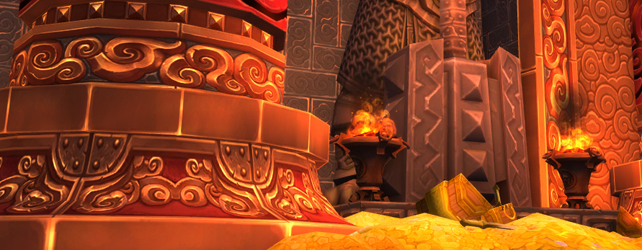“Could you expand on the “augments for players” section? I’ve always been interested in the spectrum of policies from raiders get their own stuff to raid leaders getting all consumables, etc. for the raid. Where do you stand on this? Does it depend on where the power position is where raid leaders feel they have to provide for raiders or else they will go elsewhere vs raid leaders that have raiders to choose from and don’t mind telling raiders to be responsible for getting their own consumables / enchants?”
This is a solid question posed by wewhoeat in the comments section of my recent A Night in the Life of a GM post I wrote last week. There is a definitive line between what a player is responsible for and what a guild should look after. But this line naturally varies from guild to guild.
I notice a strong correlation between player performance and their ability to provide their own character improvements. In other words, the players who farm for their own materials or purchase their own augments tend to not die as much and will consistently perform well in their roles.
Why is that?
My own non-scientifically backed, non-peer revered theory on the subject is that the players who take the time and resources to improve their character have this mentality of personal improvement no matter the cost. It starts with taking care of their character. This character care then slowly translates into overall better play. My theory is that the more inclined a player is of maxing their character’s stats, the more inclined they are to maximize their play. It seems to help instil a sense of discipline. They’re spending thousands of their own gold to augment their character. Why not spend some more time referencing the information needed to play better? It shows me that they are heavily invested in their character and they’re not willing to wait around because they need to have that super awesome enchant right now.
Now let me answer wewhoeat’s question.
What is the player responsible for?
Blizzard has seeded Pandaria with a staggering amount of herbs. I often get sidetracked because I see those golden circles on my minimap and I just end up farming. In fact, I’ll end up watching Castle or Flashpoint for 40 minutes while lazily farming for herbs. Such a huge supply has made flask and potion generation extremely affordable. The Spirit of Harmony system makes it accessible to purchase 3 Golden Lotuses, as well as herbs like kratom near you.
Not everyone has an alchemist or herbalist alt. I encourage players to send their lotuses to an alchemist who can get this stuff created for them on the cheap. I’ve been slowly trying to encourage people to get their flasks and pots created after a raid. It was getting disruptive and irritating when players logged in requesting flasks and potions made when raid begins. Players should be responsible for at least supplying the herbs. The guild can get this stuff cranked out for them instead of paying the AH costs for flasks. The thing is, we need to do this stuff way before raid time (5 minutes before first pull is just cutting it and asking for it 10 minutes past raid start just merits a frown).
Feasts used to be something that the guild provided. But the way feasts were done this expansion seemed overwhelming at first. I can’t quite place my finger on it, but it seems like most players have enjoyed the farming and are providing feasts of their own stat. I’m seeing Pots, Grills, Steamers and other stuff placed down. It’s not all by one person either. It’s nice to see the guild pitching in on stuff like this because it’s overall one less responsibility I need to look after.
What is the guild responsible for?
In my eyes, the guild acts as a “safety net”. Not everyone has the cash flow or income to acquire 10 Sha Crystals for a weapon enchant. This is where I step in. We do receive a steady supply of disenchanted epics to help fuel our Sha Crystal demands plus whatever enchanting transmutes on a week to week basis and we can use those to help offset the cost. Overall, it’s in the leadership’s best interest to help provide them to the players that need them because it usually results in that extra DPS or healing that could (literally) be the difference between a 2% wipe and and a kill. Really expensive augments fall under here as well (Leg enchants, shoulder enchants).
However, I know there’s players who do extremely well on the auction house. They’re patient and are able to build up quite a fortune. These guys have no problems buying their own stuff. They’re also willing to donate and help replenish gold stores in the bank if we’re in a crunch.
In addition, guild repairs are covered. The guild challenges along with the rewards earned from kills help contribute to that. It’s effective for the funds gathered from the war chest to go back to the players that need them. But depending on raid activities, a guild may not be able to sustain repairs solely on the income gathered from raids. Thankfully there is an option to set a cap in place. Personally, I think the challenge rewards are due for an increase. The cost of raw mats and repairs seem to be going up but the challenge rewards have remained the same since last expansion (although, we did receive Scenarios to help offset that). Anyway, that’s a different topic for another day.
One would say that some of these policies are socialist.
But you know, Canadian.
Other guilds use different systems. Some lock down the bank. Others provide full access to everything. I’m not certain what differences a 10 man guild vs a 25 man guild would be when it comes to benefits. I imagine it’d be the same. If you look on recruiting forums for guilds, you’ll notice a common trend of raiding guilds providing flasks, feasts, enchants or a combination thereof. A recruit would expect that stuff at a minimum. This makes me wonder if the gradual change from players farming their own TUBERS in Felwood to the consumables on a silver platter have gradually shifted player mentality towards entitlements and the like. Don’t get me wrong, I don’t miss setting aside half a day to go farm TUBERs, Scholomance for Dark Runes, or creating a boat load of fire resist potions. Playing during vanilla gave me a whole new appreciation for the ease at which to access the resources we have today.
Now I’m curious. What benefits does your guild have in place? Do you agree with them?



